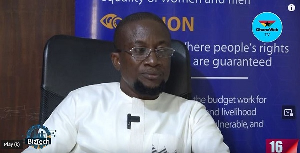Sogakope (V/R), Aug 9, GNA - Parliament's Public Accounts Committee (PAC) is to begin a public hearing on the Auditor General's report on some key institutions and sectors from August 19 to 24, this year. The public hearing would focus on reports on business registration in the country, the Ghana Police residential accommodation, management of human resources for effective primary health delivery, accountability arrangements in solid waste management and public servants housing loan scheme.
Mr Albert Kan Dapaah, Chairman of the Committee, said the hearings, the first of which took place last year, would focus on performance audit reports, unlike the previous one which looked at financial audits report.
He was speaking at a two-day workshop at Sogakope in the Volta Region, for members of the Parliamentary Press Corps to build their capacity to report on the oversight functions of the committee. The workshop sponsored by the Canadian Parliamentary Centre was also to assist the media to report objectively on the outcome of the public hearings as events unfolded.
Mr Kan Dapaah said the media may not find the focus on performance audits as sensational as that of financial audits reports.
He, however, said this year's focus was going beyond "the pesewas and cedis" to look at how work was done in terms of efficiency and whether value for money had been obtained, among other areas.
Mr Richard Quartey, Acting Auditor-General, said when Auditor-General's reports are laid by the Speaker of Parliament before the House, they are then referred to the PAC.
The Auditor-General or his representative is then invited to assist the PAC to review the report and PAC prepares its own report to members of parliament.
'"This is the stage where another level of accountability begins. Parliament, which is the highest representative body, collectively and individually, is accountable to the people. Parliament must be reflective of public and social concerns if it is to retain public legitimacy and ensure its institutional accountability".
Mr Quartey said parliamentary accountability enjoins government to be accountable.
He called for more support for the Audit Service to enable it block areas of leakages and expose irregularities.
Mr Kabral Blay-Amihere, former Ambassador to Ivory Coast, who spoke on the media, parliament and public sector accountability, urged the media to be objective in its reportage during the public hearing, which would lay bare how some institutions performed during a set time.
He said balance and fairness should "guide the press in its task over the next few weeks when the public hearing begins. The report we churn out should not be one sided but seek to capture the totality of questioning and answers that come up."
Dr Rasheed Draman, Director, Africa Programmes of the Canadian Parliamentary Centre, also urged the press to avoid an adversarial approach and report on events professionally at the hearings.
Mr Edwin Arthur, Dean of the Parliamentary Press Corps, said the drama that unfolded at the maiden public hearings of the PAC and what was happening at the on-going probe at the Ghana @ 50 celebrations, had exposed some flaws and weaknesses in the country's public accounting system.
General News of Sunday, 9 August 2009
Source: GNA
















